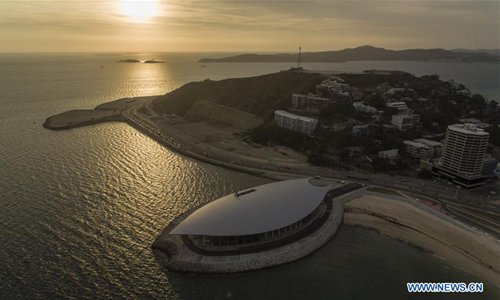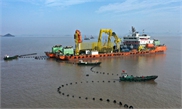
Photo taken on Nov. 11, 2018 shows the aerial view of Leaders' Conference Centre, the APEC Haus, in Port Moresby, Papua New Guinea. (Xinhua)
A joint announcement by the US, Japan and Australia to bankroll an undersea fiber optic cable project in the Pacific is nothing but an instance of economic coercion, Chinese analysts said on Monday, pointing to unfounded US allegations that derailed a similar submarine initiative with Chinese participation earlier this year.
In a joint statement over the weekend, the three countries announced that they would work in partnership with the Federated States of Micronesia (FSM), Kiribati and Nauru to build a new undersea cable to improve internet connectivity to the three Pacific nations.
The trio didn't specify their commitments to the project. The project, purportedly worth $30 million, would be the first under the trio's infrastructure partnership in the Indo-Pacific, as they seek to counter China's influence in the region, Western media reported.
As the joint statement put it, "this is more than an infrastructure investment," which "builds on the strong foundations of trilateral collaboration between Australia, Japan, and the United States in the Indo-Pacific."
News of the project instantly drew comparison with an earlier similar project involving a Chinese company, which the US spared no efforts in undermining, laying bare the US' economic coercion against not just Chinese companies but relevant countries in the Pacific, observers said.
HMN Technologies, formerly Huawei Marine Networks, submitted a bid for the $72.6 million project that designed to improve communications in the island nations of Nauru, Kiribati and FSM.
However, the World Bank-led Pacific undersea cable project sank following US warnings that the participation of Chinese firms posed a security threat, Reuters reported in June, citing unidentified sources.
Apart from the US, Nauru, which has strong ties to Australia and is a Pacific "ally" to the Taiwan island, also raised concerns over the Chinese firm's bid, according to Reuters.
Questions sent to the Chinese Embassies in FSM and Kiribati as well as the FSM's embassy in China seeking details of the project went unanswered as of press time on Monday.
Repeated calls to Hengtong's investor relations hotline also went unanswered Monday.
The US' action of undermining Chinese firm's participation in a similar project that it now seeks to fund laid bare its economic coercion tactics for its own interests, Chinese observers noted.
The setbacks encountered by HMN Technologies in the global market are a striking example of US-inflicted coercion, despite the Chinese firm's global lead in the submarine cable market, Fu Liang, an independent telecom analyst, told the Global Times on Monday.
Undersea cable technologies are comparatively mature globally, meaning there's not any firm that's exceptionally leading in technological terms, said Fu, adding that the size of the optic fibers and the time frame for completing construction were the key factors in measuring competitive edges.

